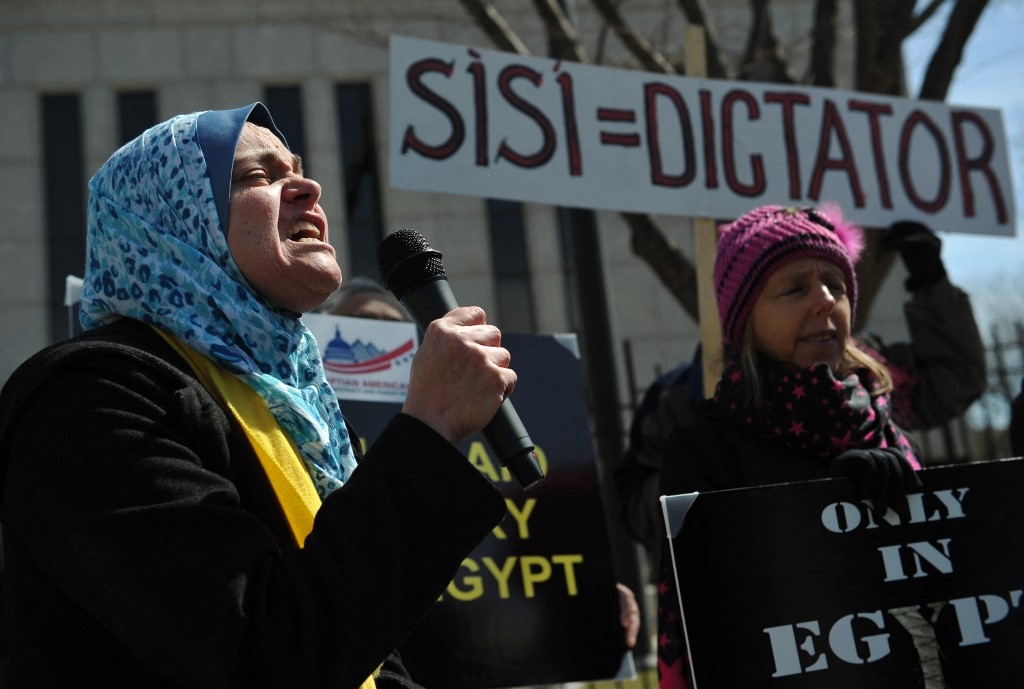Egyptians in US fear new register may be used to target dissenters

Egyptian activists residing in the United States have expressed alarm after the country's embassy in Washington DC requested the diaspora register their personal details on a non-secure website.
The request, posted by the Egyptian consulate in Washington and shared by the official Egyptian embassy Facebook page, said if Egyptians were to register on the government website their personal details would not be used to impose taxes or fees but to "provide all the services they need".
The website, which requires users to register their personal information, has been flagged as "Not Secure" by Google, with a message warning: "You should not enter any sensitive information on this site (for example, passwords or credit cards) because it could be stolen by attackers.”
'I think we have ample evidence to worry that this registry would be shared to surveil people in the US and beyond'
- Amr ElAfifi, Egyptian PhD student
Amr ElAfifi, an Egyptian PhD student working on post-Arab Spring exiles in the US, said the creation of a registry in and of itself was "neither new nor inherently illicit", but its potential for abuse was a cause for concern.
"Embassies around the world request that their nationals register with them to facilitate normal transactions and dealings," he told Middle East Eye.
New MEE newsletter: Jerusalem Dispatch
Sign up to get the latest insights and analysis on Israel-Palestine, alongside Turkey Unpacked and other MEE newsletters
"What is worrying here is that these names [could] be used for security purposes.
"I think we have ample evidence to worry that this registry would be shared to surveil people in the US and beyond, both physically and digitally, and perhaps detain them upon their arrival to Egypt."
Elisa Epstein, an advocacy officer for Human Rights Watch, added that, while the Egyptian government may have a legitimate reason to register its citizens living abroad, "it's hard to see this as anything other than an attempt by the Egyptian government to collect data on citizens that could be used to continue its pattern of harassment and intimidation of human rights activists".
The Egyptian embassy in Washington DC did not respond to Middle East Eye's request for comment.
'Disturbing increase in harassment'
According to rights groups, since President Abdel Fattah el-Sisi came to power in 2013 following a coup that toppled the country's first democratically elected president, Mohamed Morsi, authorities have jailed more than 60,000 dissidents.
The crackdown has also targeted the extended families of notable activists. Earlier this year, authorities arrested several relatives of Mohamed Soltan, a US-based rights campaigner who advocates for political prisoners in the Middle East.
In 2019, Egyptian authorities arrested Reem Desouky, an Egyptian-American art teacher who lives in Pennsylvania, over Facebook posts that were critical of the government. She was released 301 days later.
"There has been a disturbing increase in harassment of and reprisals against the family members of Egyptian activists and human rights defenders abroad in recent years, including targeting of US-based individuals," Epstein said.
"It is not surprising that many Egyptians will be wary of this type of registration when they have little reason to trust their government to protect their rights."
Another concern is that the database could be used to recruit Egyptians as spies for the government in the US.
A report issued last July by German interior minister Horst Seehofer said Egyptian secret service agents in Germany were tasked with gathering information about members of opposition groups such as the Muslim Brotherhood, as well as minority groups such as Coptic Christians.
The agents also attempted to recruit Egyptian expatriates for intelligence purposes, the report added.
"The Egyptian government managed to control everything inside Egypt," said Mohamed Mandour, a fellow at the Tahrir Institute for Middle East Policy (TIMEP), adding that the registry could help crack down on opposition abroad while also rallying Sisi supporters in the diaspora for a number of purposes, including influencing US policy and building support for the government.
"The Egyptian government is trying to use this database not only for attacking the opposition outside, and knowing their activities and activism abroad, but also to mobilise those who might be potentially useful for the Egyptian government," he said.
"For example, if they are academics, if they are working in policy circles, if they are working as journalists, if they are working for think-tanks."
Middle East Eye delivers independent and unrivalled coverage and analysis of the Middle East, North Africa and beyond. To learn more about republishing this content and the associated fees, please fill out this form. More about MEE can be found here.





